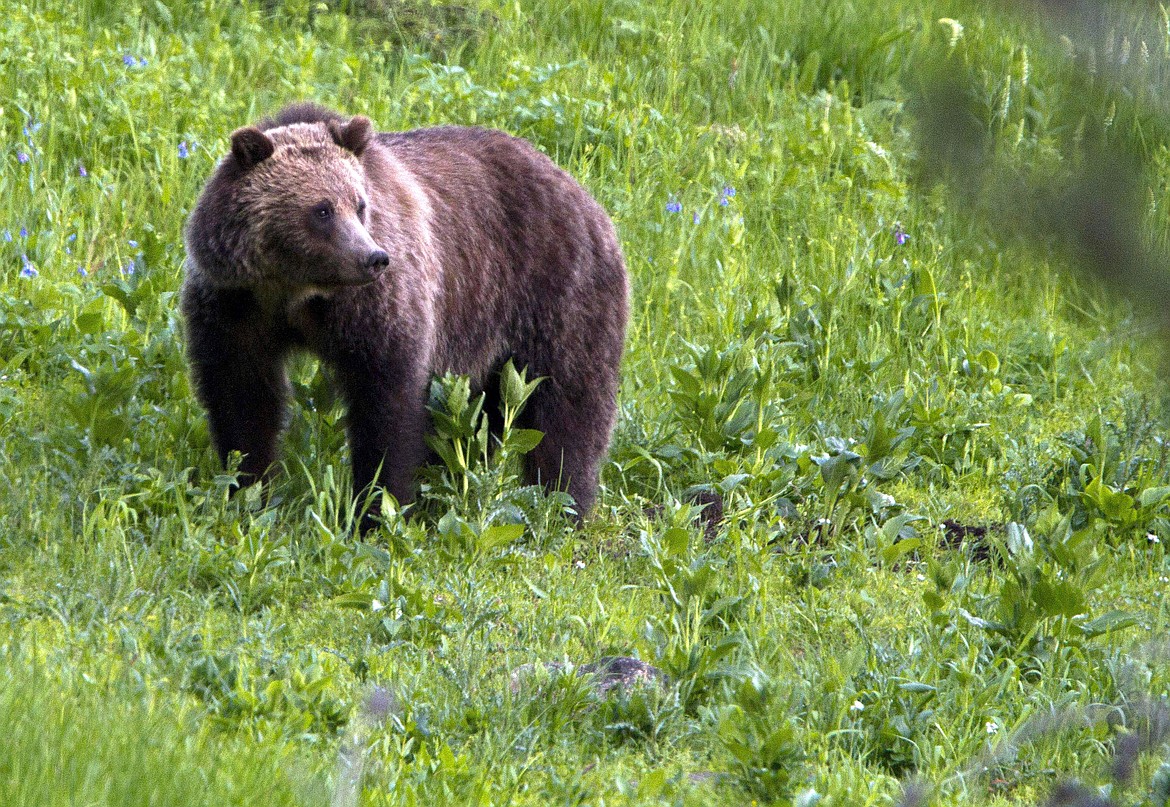Gianforte petitions to have grizzly bears delisted
Gov. Greg Gianforte’s office announced today that the state is petitioning the U.S. Fish and Wildlife Service to remove Endangered Species Act protections for grizzly bears in the Northern Continental Divide Ecosystem, citing robust population counts and touting the state’s ability to independently manage Montana’s grizzly bears, which have been federally protected since 1975.
“We worked on grizzly bear recovery for decades. We were successful and switched to a focus on conflict management years ago,” FWP Director Hank Worsech said in a release about the petition, which seeks to remove federal protections for an estimated 1,100 grizzlies in western Montana. “We’ve shown the ability to manage bears, protect their habitat and population numbers. It’s time for us to have full authority for grizzly bears in Montana.”
Gov. Greg Gianforte echoed Worsech’s assessment in the release.
“With the grizzly bear recovered, keeping the species listed under the Endangered Species Act will only continue to impact communities, farmers and ranchers, and recreationists around the state. It also limits Montana’s options when it comes to dealing with conflict bears.”
The petition also asks USFWS to designate NCDE bears as a distinct population segment, and expand that designation “well into eastern Montana.”
“This would allow for the delisting of grizzly bears across most of the northern half of the state,” the release from Gianforte’s office reads.
Alliance for the Wild Rockies Executive Director Mike Garrity, who has sued the government over previous attempts to delist grizzly bears, said that strategy runs counter to court decisions about bear recovery in a 2020 ruling stemming from a 2018 lawsuit.
“The courts ruled in the Yellowstone delisting case that there’s one population of grizzly bears, so any time they want to have a distinct population segment, they have to consider the effects on the entire population,” Garrity told Montana Free Press. “Gianforte is essentially ignoring the courts by petitioning for the NCDE population to be a distinct population segment.”
Garrity said he opposes the move to partition out the NCDE population because it would hamper the genetic exchange that helps maintain healthy populations.
Contacted for comment, retired USFWS grizzly bear recovery coordinator Chris Servheen said he’s concerned about the state’s ability to limit grizzly bear deaths with ESA protections removed.
“People tend to get all wrapped around the axle when it comes to [population counts, but] it’s really important that there be in place careful management systems so the state can manage mortality,” he said. “Delisting is not about numbers alone.”
Servheen said he’s particularly concerned about a bill passed by the Legislature this spring that hinders grizzly bears’ expansion into new recovery zones and another measure that attempts to expand the circumstances under which Montanans can kill grizzly bears.
The former, Senate Bill 337, prohibits FWP from relocating grizzly bears outside of already established recovery zones, which would slow the bears’ expansion into new areas. The latter, Senate Bill 98, would allow a person to shoot a grizzly bear that is “threatening” livestock. Servheen said neither “threatening” nor “livestock” are clearly defined by the bill. Servheen has also expressed concern about a new law that allows the hunting of black bears with hounds, an activity he says has potential to injure or kill hunters, dogs and grizzly bears.
After the announcement of the state’s petition, environmental groups including the Center for Biological Diversity and WildEarth Guardians cast doubt on Montana’s ability to successfully manage grizzly bears and the state’s motivation for seeking delisting.
“The wolf slaughter that’s happening in Montana right now demonstrates how poorly equipped Montana decision-makers are to decide the fate of these majestic species, whether grizzlies or wolves,” Wild Earth Guardians Executive Director John Horning said in an emailed statement.
“Like Wyoming and Idaho, Montana has shown repeatedly that it will do anything to appease special interests like the agricultural industry and hunting and trapping associations,” Center for Biological Diversity attorney Andrea Zaccardi said in an emailed statement. “These states just can’t be trusted to manage grizzly bears.”
Servheen said the petition puts Martha Williams, who’s been nominated to the top post at USFWS, in “a tough position.” As head of FWP under former Gov. Steve Bullock, Williams advocated turning grizzly bear management over to states, and she represented FWP in a decade-old wolf delisting lawsuit. Servheen notes that was a different time for the agency, before grizzly bear management had taken on such a political flavor in state government.
The state’s petition comes two and a half months after Wyoming made a similar request to delist Greater Yellowstone Ecosystem grizzly bears, and eight months after USFWS recommended that Lower 48 grizzly bears retain their protected status in its most recent species status assessment. USFWS’s recommendation cited concerns about habitat connectivity, human-caused mortality, motorized vehicle use in grizzly bear habitat, and uncertainty about future conservation efforts.
According to USFWS, grizzly bears currently inhabit just 6% of their historic range, which once spanned much of the American West.
This article is published courtesy of Montana Free Press.


